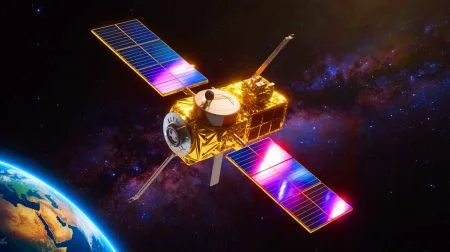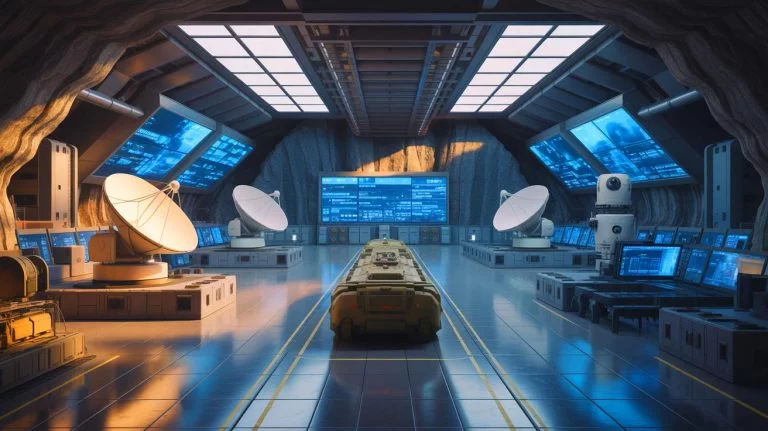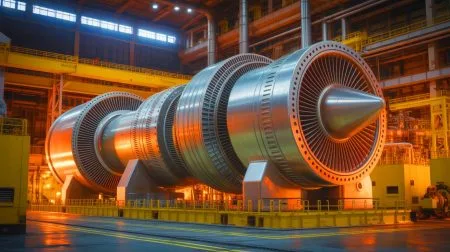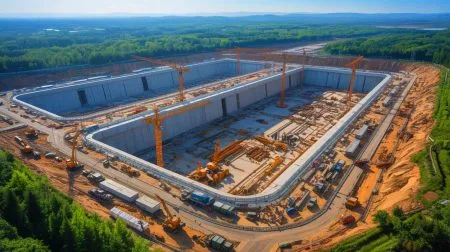| IN A NUTSHELL |
|
In recent weeks, the international community has been captivated by revelations of China’s construction of an immense underground military command center near Beijing. This development, uncovered through satellite imagery, underscores China’s strategic ambitions to challenge the United States and reshape global power dynamics. As experts and observers scrutinize these developments, the implications for regional and global security are profound. With tensions simmering across Asia, understanding the broader impact of this project is crucial for assessing future geopolitical shifts.
China’s Ambitious Military Vision
China’s latest military endeavor signifies a bold step in its long-standing quest for strategic military advancement. This massive underground command center harkens back to Cold War-era strategies, where subterranean facilities were vital for safeguarding military assets. Since the 1980s, China has been investing in specialized teams dedicated to constructing bunkers capable of withstanding severe bombardments. Today, China is elevating this approach to new heights, potentially creating the largest underground military command center ever.
The sheer scale of this project highlights China’s determination to protect its military resources against potential threats. Amid rising geopolitical tensions in Asia, this development reflects China’s commitment to strengthening its defense infrastructure. It also exemplifies the evolving nature of military strategy, where technological innovation and strategic positioning are paramount to national security in the 21st century.
Implications for Global Security
The construction of China’s underground military complex carries significant implications for global security. As China expands its military prowess, neighboring nations and global powers are reevaluating their security postures. This project is not merely about demonstrating military strength; it signifies a potential shift in the balance of power in Asia and beyond. The strategic importance of this endeavor cannot be underestimated, as it may influence the dynamics of military alliances and defense strategies worldwide.
China’s actions may prompt reactions from other major powers, potentially igniting an arms race reminiscent of the Cold War. The United States, in particular, might feel pressured to bolster its military presence in the region to counterbalance China’s growing influence. These developments pose critical questions for the future of international relations and the potential for either conflict or collaboration in addressing shared security challenges.
Technological Sophistication and Strategic Depth
Central to China’s military project is an emphasis on technological sophistication and strategic depth. The underground command center is anticipated to feature advanced technologies, including state-of-the-art communication systems and cutting-edge defense mechanisms. This technological prowess reflects China’s broader ambition to ascend as a leading military power, capable of matching the technological advancements of the United States and other military giants.
The strategic depth of this project also underscores China’s long-term vision for its defense strategy. By investing in subterranean infrastructure, China is ensuring the resilience and sustainability of its military capabilities. This approach not only shields its assets from conventional threats but also positions China as a formidable force in potential future conflicts. Consequently, this development marks a new chapter in China’s military history, characterized by innovation and strategic foresight.
Regional Reactions and Future Prospects
The unveiling of China’s underground military complex has sparked diverse reactions across the region. Neighboring countries are vigilantly monitoring the situation, with some expressing concerns over the potential ramifications for regional stability. Others are contemplating strategic partnerships and alliances to counteract China’s expanding military influence. This development has undoubtedly prompted a reevaluation of defense strategies across Asia, as nations navigate the shifting geopolitical landscape.
Looking ahead, the future prospects of this project will hinge on China’s ability to manage its regional relationships and address the concerns of the international community. The success of this initiative could redefine China’s global role, potentially leading to new alliances and diplomatic engagements. However, it also raises important questions about the potential for conflict and cooperation in a world increasingly defined by military prowess and strategic competition.
As China’s military ambitions continue to unfold, the world watches closely. The construction of this underground command center is a clear signal of China’s resolve to assert its influence and safeguard its interests. In this era of rapid geopolitical changes, how will other nations respond to China’s growing military might? Will this development lead to increased cooperation or heightened tensions among global powers?
Did you like it? 4.5/5 (30)








Wow, 1,000 acres? That’s like a military Disneyland! 🎢
Does anyone else feel like we’re living in a James Bond movie? 🤔
The scale of this project is mind-blowing. How did they manage to keep it a secret for so long?
Why is China building such a massive facility underground? Are they expecting an alien invasion? 👽
Thank you for the detailed analysis. This is quite concerning for global peace.
Is there any indication of what other countries are planning in response? 🤷♀️
Can we trust satellite imagery for such significant geopolitical claims?
That’s a lot of land being used for military. What about the environment? 🌱
China’s ambitions are clear, but what are their ultimate goals?
Does this remind anyone else of the Cold War era arms race?
I wonder if this will lead to an increase in military spending worldwide.
Are these underground facilities as bombproof as they claim? 💣
This is a huge power move. What’s next, a space station? 🚀
Will this project lead to a new era of military technology?
Great article! But can we be sure this is the largest since WW2?
I’m concerned about the implications for regional stability in Asia.
How does this affect China’s relationship with its neighboring countries?
An impressive undertaking, but what’s the cost to the citizens? 😟
Is this underground hub supposed to be a deterrent or a threat?
Does anyone know how this compares to US military facilities?
China’s military strategy seems to be advancing rapidly. Should we be worried?
What are the chances of other countries forming alliances against China?
This development could reshape international relations. Crazy times!
Is there any chance of this project sparking a new arms race?
Another step towards world domination? 🗺️
How effective are these underground facilities in modern warfare?
Thank you for shedding light on this important issue. We need more awareness.
Is this facility part of a broader military strategy by China?
Are there any diplomatic solutions being discussed to address this?
Is there any possibility that this is just for defensive purposes? 🤨
Are other countries considering similar underground military projects?
How does this impact global military alliances?
How will this affect China’s relationship with the US?
What’s stopping other countries from building similar facilities?
Thanks for the article! Let’s hope for more peaceful solutions. ✌️